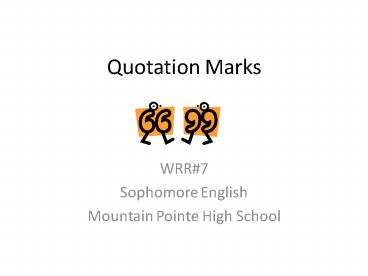Quotation Marks PowerPoint PPT Presentation
1 / 16
Title: Quotation Marks
1
Quotation Marks
- WRR7
- Sophomore English
- Mountain Pointe High School
2
Quotation Marks May Be Used for Writing
- Titles of Minor Works, or Parts of Wholes
- Direct Quotations
- Dialogue
- Specific Words
3
Titles of Minor Works or Parts of Wholes
- Use quotation marks for titles of short or minor
works, such as - songs, short stories,
- essays,
- short poems,
- one-act plays,
- and other literary works that are shorter
- than a three-act play or a complete
book.
4
Direct Quotations
- Direct quotations are another person's exact
words--either spoken or in print--incorporated
into your own writing.
Mr. and Mrs. Allen, owners of a 300-acre farm,
said, "We refuse to use that pesticide because it
might pollute the nearby wells."
5
Direct Quotations contd.
- If the quotation is interrupted and then
continues in your sentence, do not capitalize the
second part of the quotation.
"He likes to talk about football," she said,
"especially when the Super Bowl is coming up."
6
Direct Quotations contd.
- Use a set of quotation marks to enclose each
direct quotation included in your writing.
Mr. and Mrs. Allen stated that they "refuse to
use that pesticide" because of possible water
pollution.
7
Direct Quotations contd.
- Use a capital letter with the first word of a
direct quotation of a whole sentence.
The welfare agency representative said, "We are
unable to help every family that we'd like to
help because we don't have the funds to do so."
8
Direct Quotations contd.
- Do not use a capital letter with the first word
of a direct quotation of part of a sentence.
The welfare agency representative explained that
they are "unable to help every family because of
lack of funding.
9
Direct Quotations contd.
- If the quotation is interrupted and then
continues in your sentence, do not capitalize the
second part of the quotation.
Your essays, the teacher said, are due on
Wednesday.
10
Dialogue
- Write each person's spoken words, however brief,
as a separate paragraph. Use commas to set off
dialogue tags such as "she said" or "he
explained."
11
Dialogue contd.
- Did you see her? asked grandma.
- Yes! Wasnt she stunning? said Susan.
- I thought she was scandalous! replied grandma.
- True, but in a very chic way! said Susan
grinning.
12
Dialogue contd
- Closely related narrative prose can be included
in a paragraph with dialogue.
Harry looked into the shimmering pool of water.
Slowly, because it was so cold, he removed his
clothing and hung it in a nearby tree. He looked
at Ron and shouted, Geronimo!, and jumped into
the pool.
13
Dialogue contd
- If one person's speech goes on for more than one
paragraph, use quotation marks to open the speech
and at the beginning--but not the end--of each
new paragraph in the speech.
To close the speech, use quotation marks at the
end of the final paragraph.
14
Specific Words
- Use quotation marks to indicate words used
ironically, with reservations, or in some unusual
way.
The great march of "progress" has left millions
impoverished and hungry.
15
Specific Words contd.
- For words used as words themselves or for
technical or unfamiliar terms used for the first
time (and defined), use italics quotes.
The English word nuance comes from a Middle
French word meaning "shades of color."
16
Indirect Quotes
- An indirect quote is when a writer only writes
the general meaning of what a person said. In
this case, there is no need for quotation marks.
No barrier of the senses shuts me out from the
sweet gracious discourse of my book friends.
Helen Keller
vs.
Helen Keller wrote that being blind and deaf did
not prevent her from enjoying reading.

